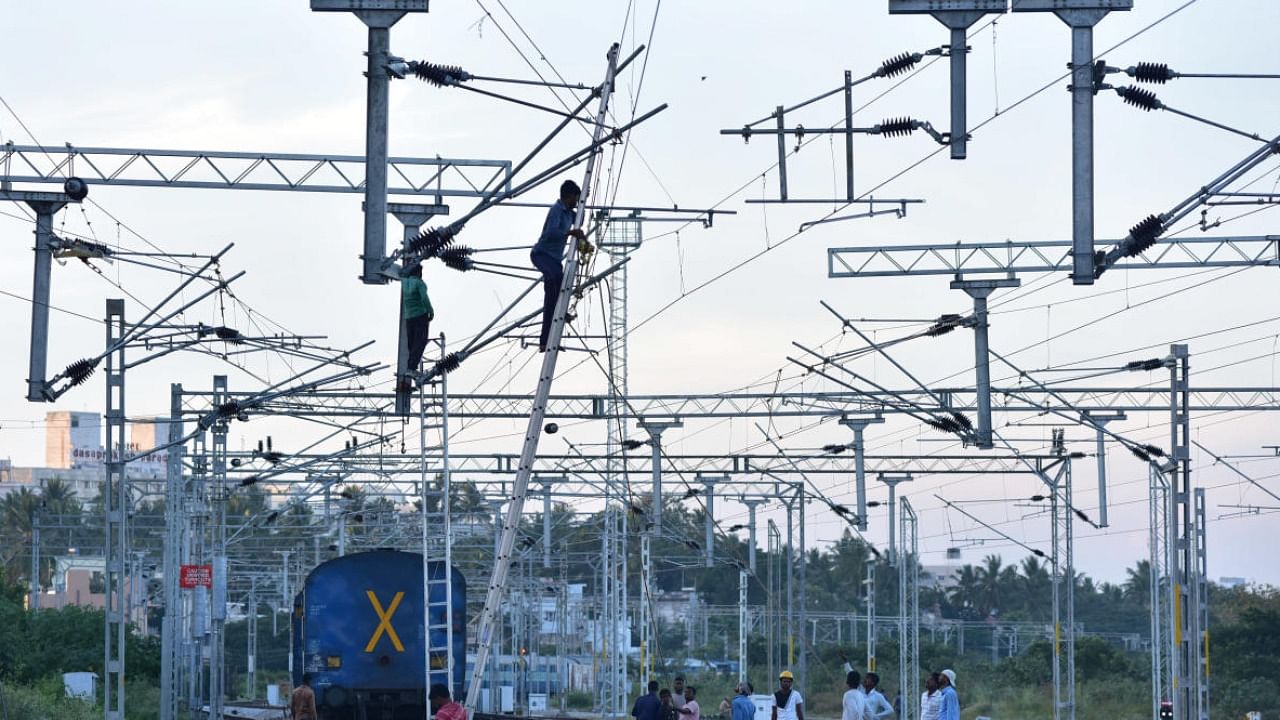
Karnataka, long a laggard in railway electrification, is finally electrifying its broad-gauge network at a brisk pace.
The state has electrified 2,991 Route Kilometres (RKM) out of its total railway network of 3,836 RKM, data reviewed by DH shows. In percentage terms, 77.97 per cent of the state’s railway network is now electrified.
Of this, 148 RKM was electrified in July alone, between 21 and 31. On Sunday, the railways commissioned the Kumsi-Anandapura stretch (31 RKM), part of the Shivamogga-Talguppa railway line.
In railway terminology, RKM refers to the distance between two places irrespective of the number of tracks.
Railway electrification in Karnataka is being carried out by four agencies: Central Organisation for Railway Electrification (CORE), RITES, Rail Vikas Nigam Limited (RVNL) and Power Grid Corporation of India (PGCI).
Shyam Sundal Mangal, Chief Project Director (Railway Electrification), Bengaluru, said CORE had finished two of the six works planned for 2023-24.
Of nearly 270 RKM scheduled for electrification in the current fiscal year, it has already commissioned 81 RKM. "The rest will be commissioned by March 2024," he told DH.
He said Vyasa Colony-Swamihalli (40 RKM) would be completed in August, and Anandapura-Talaguppa (43 RKM) and Hirisave-Shravanabelagola-
According to Mangal, CORE could have finished all the works by December if not for the ongoing doubling of the Navanagar-Bagalkot-Wandal section.
"The stretch is expected to be doubled by March. We will also finish electrification by that time," he added.
CORE has also built Traction Sub Stations (TSS) to supply power to 25kV overhead lines.
Karnataka is, however, unlikely to achieve 100 per cent electrification by March 2024, a target set by the railway ministry.
The South Western Railway (SWR), with 84 per cent of its jurisdiction lying under Karnataka, has electrified about 2,700 RKM of its total network of 3,606 RKM.
Apart from the SWR, Karnataka’s rail network comes under the South Central Railway (SCR), the Central Railway (CR), the Southern Railway (SR) and the Konkan Railway.
While the SR, the CR and the Konkan Railway have fully electrified their network in Karnataka, the SCR has to electrify only a part of the 110-km Bidar-Kalaburagi line. This project is currently in tendering.
In SWR limits, electrifying the last remaining stretch (Vyasa Colony-Amaravati, 120 RKM) will take more than a year because the project is still in tendering, informed sources said.
Track electrification, though costly at the beginning, provides many long-term benefits. In addition to introducing more and heavier trains, it boosts speed, saves money and reduces pollution. In particular, it helps avoid train detention at stations by eliminating the need to change the locomotive from diesel to electric.
Financial benefits are also substantial. For example, the SWR saved a good Rs 205 crore in 2022-23 by not having to buy diesel.
Electrifiying one Track Kilometre (TKM) costs Rs 90 lakh to Rs 1 crore and twice as much if it's a double track. Setting up a TSS costs Rs 5-10 crore, according to Mangal.
To date, CORE has electrified 1,425 RKM in Karnataka. It spent Rs 1,578 crore until March 2023 and Rs 1,722 crore until June 2023, he added.
SWR Chief Public Relations Officer Aneesh Hegde said savings from this year’s electrification would be calculated once traction was changed to electric.
“We will calculate the savings once the entire route is electrified,” he said.
K N Krishna Prasad of Karnataka Railway Vedike praised the speedy electrification and said progress would have been faster had CORE been given all the projects.